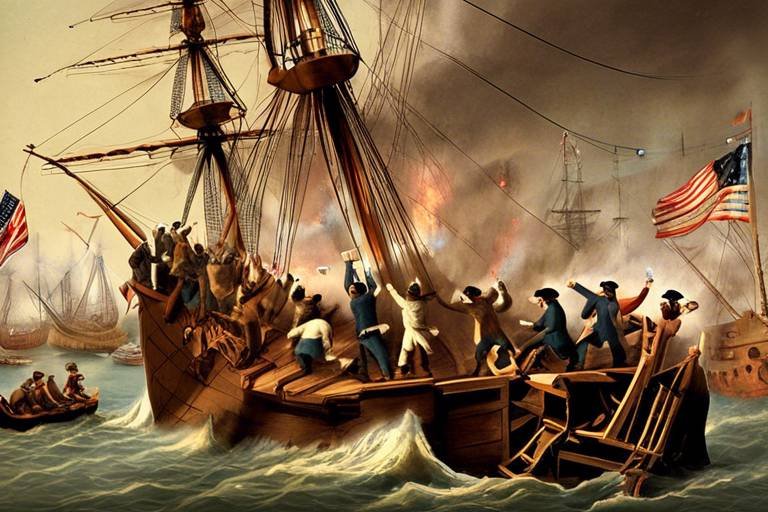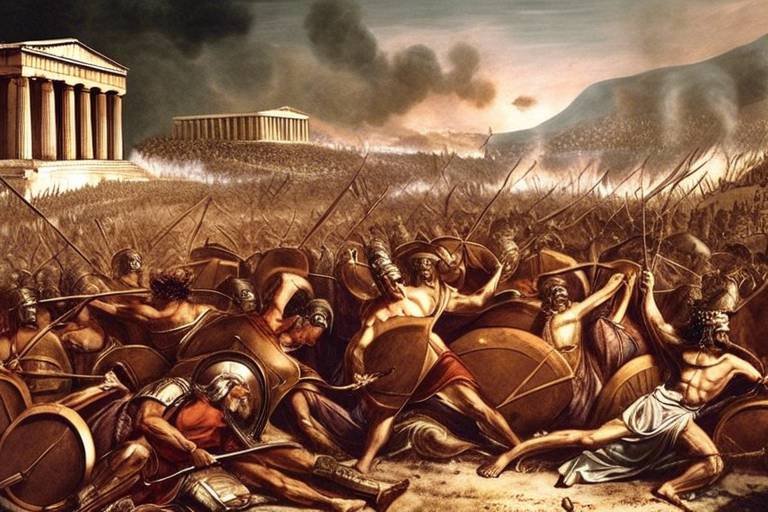The Boston Tea Party - A Catalyst for Revolution
The Boston Tea Party stands as a pivotal moment in American history, serving as a catalyst for the revolutionary spirit that ultimately led to the birth of a nation. This iconic event, which took place on December 16, 1773, in Boston Harbor, Massachusetts, marked a turning point in the colonists' struggle against British oppression.
One of the primary causes that fueled the Boston Tea Party was the issue of taxation without representation. The colonists, already burdened by various taxes imposed by the British government, vehemently opposed the Tea Act of 1773, which granted the British East India Company a monopoly on tea imports to the colonies. This act was seen as a blatant attempt to assert British authority and control over the American colonies.
Key figures such as Samuel Adams and Paul Revere played instrumental roles in organizing and executing the Boston Tea Party. These individuals, along with other patriots, defied British authority by disguising themselves as Mohawk Indians and dumping chests of tea into the harbor as a bold act of protest against unjust British policies.
The Tea Act of 1773 further fueled colonial resentment towards British rule, prompting widespread outrage and defiance among the colonists. This legislation served as a tipping point, galvanizing the colonists to take a stand against oppressive British policies and assert their right to self-governance.
In response to British tyranny, the colonists mobilized through boycotts, protests, and acts of civil disobedience, laying the groundwork for the Boston Tea Party. This act of resistance not only symbolized colonial unity but also ignited a fervent desire for independence and freedom from British rule.
The impact of the Boston Tea Party reverberated far beyond the shores of America, garnering international attention and admiration for the colonists' bold defiance against imperial power. The event inspired similar movements for independence and self-governance around the world, leaving a lasting imprint on the course of history.
Even today, the legacy of the Boston Tea Party endures in American history, commemorated through annual events and symbolic gestures that celebrate the spirit of rebellion and resilience that defined the American Revolution. The Boston Tea Party remains a powerful reminder of the enduring quest for freedom and justice that continues to shape the nation.
- What was the significance of the Boston Tea Party?
- Who were the key figures involved in the Boston Tea Party?
- How did the Boston Tea Party impact the course of history?
The Boston Tea Party was a significant event that fueled the revolutionary spirit in the American colonies, leading to increased tensions with British authorities and ultimately contributing to the outbreak of the American Revolution.
Prominent figures such as Samuel Adams, Paul Revere, and other patriots played crucial roles in organizing and executing the Boston Tea Party, defying British authority and sparking a wave of resistance against unjust British policies.
The Boston Tea Party galvanized colonial unity and anti-British sentiment, fueling the push for independence and inspiring similar movements for self-governance and independence worldwide.

Causes of the Boston Tea Party
The Boston Tea Party was not a random act of rebellion but a culmination of various factors that fueled the colonists' discontent with British rule. One of the primary causes was taxation without representation, where the British Parliament imposed taxes on the colonies without allowing them a voice in the decision-making process. This lack of representation led to growing resentment among the colonists, who felt their rights were being trampled upon.
Another significant factor was the Tea Act of 1773, a legislation passed by the British government to grant the financially troubled East India Company a monopoly on tea sales in the American colonies. This act not only threatened the livelihood of colonial merchants but also symbolized British oppression and control over the colonies' economy.
Colonial resistance to British policies also played a crucial role in setting the stage for the Boston Tea Party. The colonists had been increasingly vocal in their opposition to British rule, organizing boycotts and protests to challenge unjust laws and taxes imposed by the British government. The mounting tension between the colonies and Britain eventually reached a boiling point, leading to the iconic protest in Boston Harbor.

Key Players in the Event
During the tumultuous times leading up to the American Revolution, several key figures emerged as influential players in the events surrounding the Boston Tea Party. One such figure was Samuel Adams, a passionate patriot and political agitator who played a pivotal role in organizing the protest against the British tea tax. Adams' fiery speeches and relentless advocacy for colonial rights helped galvanize public support for the cause of independence.
Another notable figure was Paul Revere, famous for his midnight ride to warn the colonial militia of the approaching British troops. Revere's involvement in the Sons of Liberty, a secret organization dedicated to resisting British rule, further solidified his place in American history. His participation in the Boston Tea Party symbolized the spirit of defiance that characterized the colonists' resistance to British oppression.
Additionally, John Hancock, a wealthy merchant and prominent political leader, played a significant role in financing and supporting the activities of the Sons of Liberty. Hancock's bold stance against British tyranny and his unwavering commitment to the cause of liberty made him a respected figure among his fellow colonists.
These key players, along with many others, exemplified the courage and determination of the American patriots who stood up against the might of the British Empire. Their actions during the Boston Tea Party not only sparked a revolution but also laid the foundation for the birth of a new nation founded on principles of freedom and self-governance.

The Tea Act of 1773
The Tea Act of 1773 was a pivotal piece of legislation passed by the British Parliament that had far-reaching consequences in the American colonies. This act was not just about tea; it was a symbol of British authority and taxation without representation that ignited the flames of rebellion among the colonists.
Under the Tea Act, the British East India Company was granted a monopoly on the tea trade in America, allowing them to sell tea directly to the colonies without paying the usual taxes imposed on colonial merchants. This move was seen as a direct threat to local businesses and a clear display of British economic dominance over the colonies.
Furthermore, the Tea Act also allowed for the sale of surplus tea from the British East India Company at reduced prices, making their tea more affordable than that of local merchants. This undercutting of prices was not only a blow to colonial businesses but also a blatant attempt to force the colonists to accept British goods and pay the imposed taxes.
The colonists saw the Tea Act as a clear violation of their rights and a direct attack on their economic freedom. They viewed it as yet another attempt by the British government to assert control over the colonies without their consent. The Tea Act of 1773 served as the final straw that pushed the colonists to take a stand and resist British oppression.

Colonial Response and Resistance
During the period leading up to the Boston Tea Party, the American colonists were faced with increasing discontent over British policies and taxation. The imposition of taxes without colonial representation in the British Parliament, such as the Stamp Act and Townshend Acts, had already stirred resentment among the colonists. The Tea Act of 1773 further exacerbated tensions by granting the British East India Company a monopoly on tea sales in the colonies, undercutting local merchants and leading to fears of further economic exploitation.
In response to these oppressive measures, the colonists organized various forms of resistance to British authority. One notable method was the widespread boycott of British goods, including tea, as a means of protesting against unjust taxation and asserting their economic independence. Acts of civil disobedience, such as the famous Boston Tea Party, where colonists disguised as Native Americans boarded ships in Boston Harbor and dumped chests of tea into the water, became powerful symbols of colonial defiance against British rule.
The Boston Tea Party, occurring on December 16, 1773, was a pivotal moment in the escalation of tensions between the American colonies and the British government. It demonstrated the colonists' willingness to take bold and decisive action to resist British oppression and assert their rights to self-governance. The event not only symbolized colonial unity and resolve but also marked a turning point in the push for American independence.

Impact on the American Revolution
The Boston Tea Party of 1773 was not just a simple act of defiance; it was a spark that ignited the flames of revolution. The event sent shockwaves through the colonies, uniting them in a common cause against British oppression. The symbolic act of dumping tea into Boston Harbor was a powerful statement of resistance, showing that the colonists were willing to take bold and decisive action to assert their rights.
The repercussions of the Boston Tea Party were profound. It galvanized colonial unity like never before, with people from different backgrounds coming together in opposition to British tyranny. The protest fueled anti-British sentiment and served as a rallying cry for those advocating for independence. It was a turning point in the American Revolution, pushing the colonies closer towards the inevitable clash with the British Crown.
Furthermore, the Boston Tea Party had ripple effects that extended far beyond the shores of America. News of the protest spread quickly, inspiring other movements for independence and self-governance around the world. The bold act of resistance in Boston Harbor became a symbol of defiance against oppressive regimes everywhere, resonating with people fighting for freedom and autonomy globally.

International Reaction
When the news of the Boston Tea Party reached far beyond the shores of the American colonies, it caused shockwaves across the globe. The international reaction to this daring act of defiance against British authority was a mix of astonishment, admiration, and concern. In Europe, many hailed the colonists' bold move as a stand for liberty and self-governance, resonating with the growing sentiments of independence and individual rights. The Boston Tea Party served as a beacon of hope for oppressed peoples in other parts of the world, inspiring them to challenge oppressive regimes and fight for their own freedom.
On the other hand, the British government and its allies viewed the Boston Tea Party as a dangerous precedent that threatened the stability of their colonial empires. The audacity of the colonists to openly defy British rule raised fears of rebellion spreading to other territories under British control. This event prompted a crackdown on dissent and fueled efforts to tighten control over the colonies, leading to further tensions and eventually escalating into full-scale conflict.

Lingering Legacy and Commemoration
After the tumultuous events of the Boston Tea Party, its legacy continues to linger in American history, serving as a powerful symbol of resistance against oppression and a catalyst for revolutionary change. The act of defiance by the colonists in dumping tea into Boston Harbor resonates through the centuries, reminding us of the courage and determination of those who stood up against tyranny.
Commemoration of the Boston Tea Party is an integral part of American historical consciousness, with various annual events and ceremonies held to honor the brave actions of the patriots. These commemorations serve as a reminder of the sacrifices made by those who fought for freedom and justice, inspiring future generations to uphold the values of liberty and democracy.
One notable way in which the legacy of the Boston Tea Party is honored is through the reenactment of the event, where participants dress in period costumes and recreate the protest in vivid detail. This immersive experience allows people to step back in time and gain a deeper understanding of the significance of the Tea Party in shaping the course of American history.
Furthermore, the Boston Tea Party Ships and Museum stands as a living testament to the events of that fateful night, offering visitors a chance to explore interactive exhibits, artifacts, and educational programs that bring the past to life. Through these immersive experiences, the legacy of the Boston Tea Party is kept alive for generations to come, ensuring that its impact is never forgotten.
Frequently Asked Questions
- What was the main reason behind the Boston Tea Party?
The primary cause of the Boston Tea Party was the Tea Act of 1773, which imposed taxes on tea imported to the American colonies without their consent. This act was seen as a violation of the colonists' rights and led to widespread outrage.
- Who were the key figures involved in organizing the Boston Tea Party?
Prominent figures such as Samuel Adams, Paul Revere, and the Sons of Liberty played crucial roles in orchestrating the Boston Tea Party. They were instrumental in planning and executing the protest against British taxation policies.
- How did the Boston Tea Party impact the American Revolution?
The Boston Tea Party served as a catalyst for the American Revolution by uniting the colonies against British oppression and sparking a spirit of resistance. It fueled the push for independence and set the stage for the eventual break from British rule.
- What was the international reaction to the Boston Tea Party?
The Boston Tea Party garnered international attention and support for the American cause for independence. It inspired other movements worldwide seeking freedom from colonial rule and self-governance, leaving a lasting impact on global history.
- How is the Boston Tea Party commemorated in modern times?
The Boston Tea Party is commemorated through annual events and historical reenactments that highlight its significance in American history. It continues to symbolize the spirit of defiance and the fight for liberty in contemporary society.



















